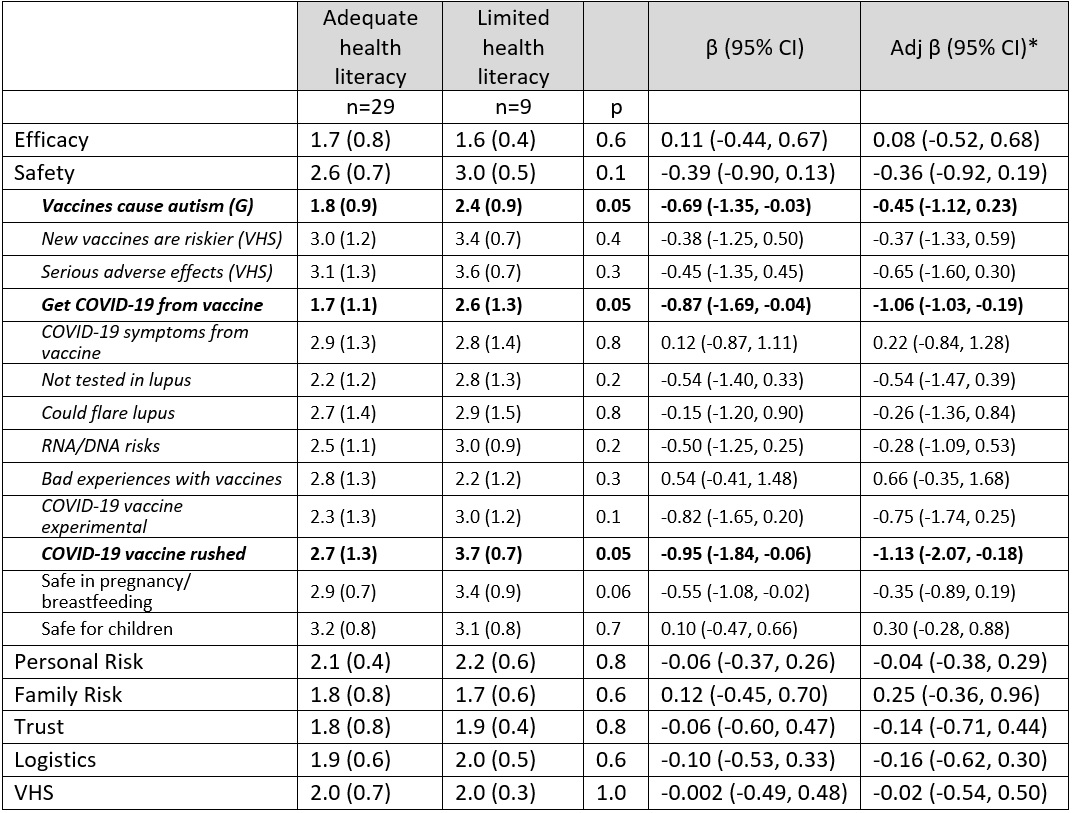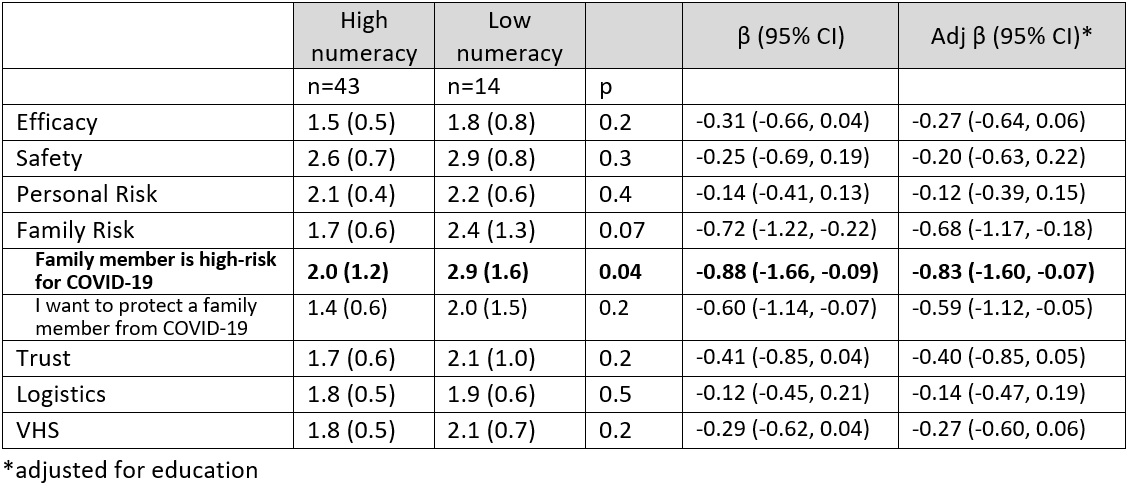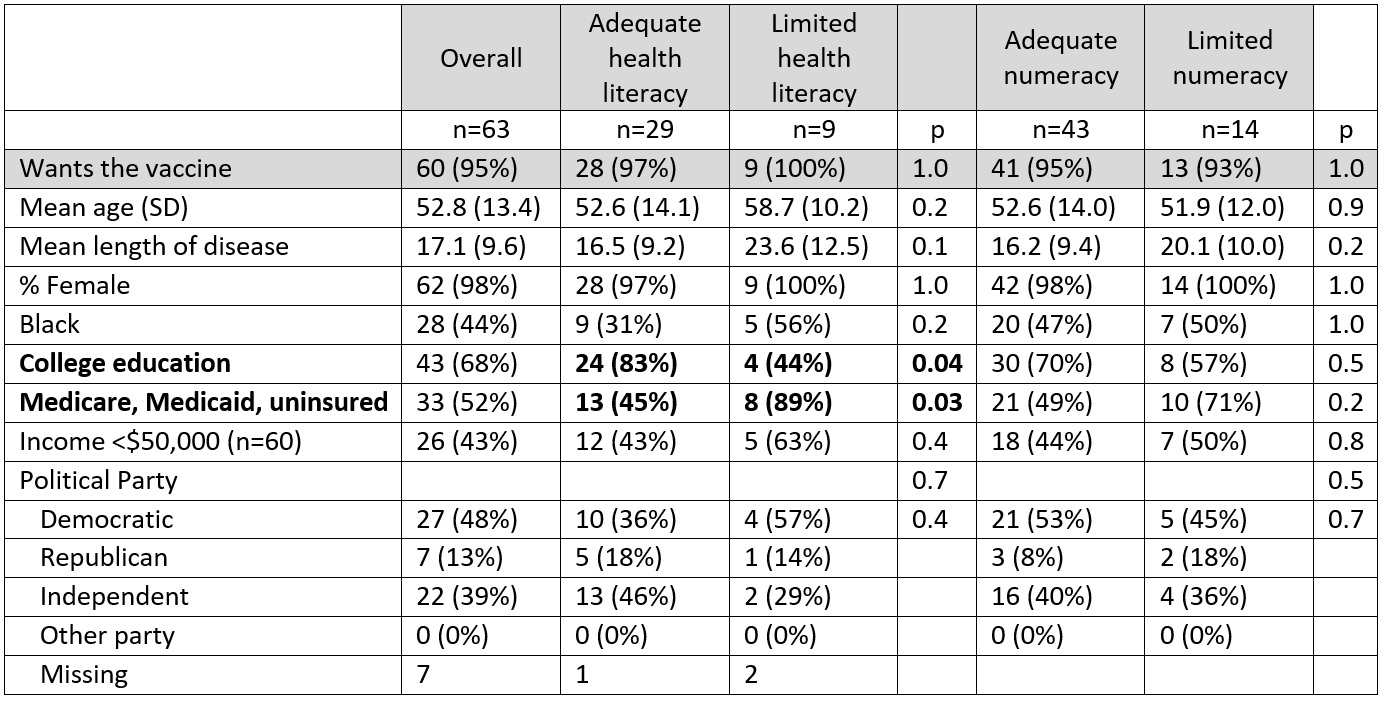Session Information
Date: Tuesday, November 9, 2021
Title: Patient Outcomes, Preferences, & Attitudes Poster IV: COVID-19 (1589–1613)
Session Type: Poster Session D
Session Time: 8:30AM-10:30AM
Background/Purpose: The ACR has issued guidance recommending COVID-19 vaccine for all patients with rheumatic diseases. Vaccine hesitancy research prior to the COVID-19 pandemic has demonstrated associations between health literacy and vaccine hesitancy. In this study, we assessed the relationship between SLE patients’ desire to receive a COVID-19 vaccine and their health literacy/numeracy.
Methods: Health literacy was assessed by the Newest Vital Sign (NVS); NVS < 4 denotes limited health literacy. Numeracy was assessed with the Subjective Numeracy Scale (SNS-3); SNS-3 ≤12 was considered to be low numeracy. The Vaccine Hesitancy Scale (VHS) was modified to assess adult vaccine beliefs, with additional questions specific to the COVID-19 vaccine and patients’ self-assessed COVID-19 risk. The survey also asked whether patients would choose to get the COVID-19 vaccine if it were made available to them the following week (definitely/probably vs probably not/definitely not). The survey was distributed by email on 02/24/2021 to the 353 patients in the Duke Lupus Registry, all of whom met ACR or SLICC criteria for SLE. Linear regression models adjusted for education estimated the associations of health literacy and numeracy on the desire to receive the COVID-19 vaccine.
Results: A total of 63 patients who completed the COVID-19 vaccine had recently completed an assessment of health literacy or numeracy: 38 patients had completed the NVS, 57 had completed the SNS-3, and 32 had completed both. Overall, 98% of respondents were female, 56% White, and 68% college educated (Table 1). Patients with adequate health literacy were more likely to be college educated (p=0.04), and patients with limited health literacy were more likely to lack private health insurance (p=0.03); these associations were not seen for numeracy.
Importantly, 60 out of 63 SLE patients (95%) wanted to receive the COVID-19 vaccine as soon as possible. Adequate and limited literacy patients had similar VHS scores and were similar on most sub-scales, although there was a trend toward more hesitancy in the low literacy group for the Safety sub-scale (Table 2). Within this sub-scale, even after adjusting for education, limited literacy patients were more likely to express fear of vaccines causing autism (p=0.05), fear of getting COVID-19 from the vaccine (p=0.05), and fear that the COVID-19 vaccine was rushed (p=0.05). Limited numeracy patients were less likely to agree with having a family member who is high-risk for COVID-19, although their assessment of personal risk for severe COVID-19 was similar to adequate numeracy patients (Table 3).
Conclusion: The vast majority of SLE respondents wanted to receive the vaccine, regardless of health literacy and numeracy status. Patients with limited health literacy were more likely to believe vaccine falsehoods, including concerned that vaccines cause autism, that they could get COVID-19 from the vaccine, and that the COVID-19 vaccine was rushed; such patients may be more susceptible to vaccine conspiracy theories.
 Table 2. Associations between literacy and vaccine beliefs.
Table 2. Associations between literacy and vaccine beliefs.
 Table 3. Associations between numeracy and vaccine beliefs.
Table 3. Associations between numeracy and vaccine beliefs.
To cite this abstract in AMA style:
Sadun R, Maheswaranathan M, Clowse M, Sun K, Rogers J, Doss J, Criscione-Schreiber L, Eudy A. The Impact of Health Literacy and Numeracy on COVID-19 Vaccine Hesitancy in SLE [abstract]. Arthritis Rheumatol. 2021; 73 (suppl 9). https://acrabstracts.org/abstract/the-impact-of-health-literacy-and-numeracy-on-covid-19-vaccine-hesitancy-in-sle/. Accessed .« Back to ACR Convergence 2021
ACR Meeting Abstracts - https://acrabstracts.org/abstract/the-impact-of-health-literacy-and-numeracy-on-covid-19-vaccine-hesitancy-in-sle/

